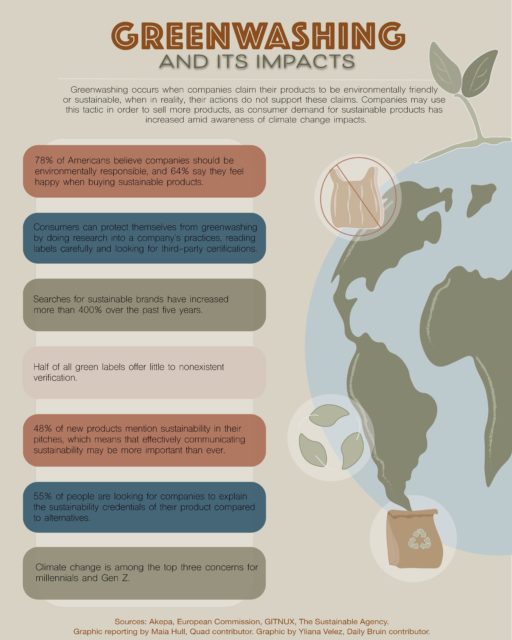Amid conversations about climate change and planetary health, advertisements from many different sectors boast eco-friendly messages that may make consumers feel more compelled to choose some products over others.
According to the Journal of Business and Technical Communication, when consumers believe an organization has a high corporate social responsibility, the company has a better reputation and higher consumer loyalty.
However, a company advertising that it is eco-friendly does not necessarily mean that it actually practices sustainability.
Nurit Katz, chief sustainability officer at UCLA, said greenwashing occurs when companies utilize marketing and communication strategies that present themselves as eco-friendly, but their claims are not truthful.
“It’s kind of like talking the talk but not walking the walk,” Katz said. “You know, these claims can be misleading, they can be deceitful. They might also just be very vague and nonspecific in a way that doesn’t … provide the transparency.”
Sociology professor Rebecca Jean Emigh said greenwashing is widespread and companies frequently engage in it in hopes of increasing revenue, but being truly sustainable should involve buying less.
“There’s some general impression in the public that there’s certain things that are really harming the environment, and so they’re (companies) taking advantage of that just to sell more stuff,” Emigh said. “There’s no way we can buy our way out of the climate crisis. … Buying something is not good for the environment.”
For example, Keurig, a coffee company that utilizes single-use pods for its machines, was questioned by Canada’s Competition Bureau about the validity of the claims it was making regarding the recyclability of its pods.
Keurig claimed consumers could toss their used coffee pods into their recycling bins, and they would be accepted across Canada. In reality, the pods were only recyclable in certain provinces and only after taking certain steps to prepare them, which Keurig left out of its recyclability claims. Keurig advertised these recyclability claims on its website, social media and packaging.
According to the European Commission, 53% of green-labeled products give vague and misleading information, and 40% of claims have zero supporting evidence.
Katz added that greenwashing can enable corporations to present false information to consumers because of a lack of regulations on products.
“It can just be used as a claim to try and sell to consumers that are interested but doesn’t have to be backed up by actions,” Katz said. “Some companies may sort of tout surface-level sustainability initiatives … without really undertaking meaningful change in their operations.”
When claims of a company greenwashing are exposed, its reputation may take a hit. According to the Journal of Business and Technical Communication, consumers’ ideas and behaviors toward a brand may be negatively affected if greenwashing is revealed.
Frances Park-Steskal, a first-year environmental science student, said exposed greenwashing would definitely change her perception of a company because sustainability is something that she tries to promote.
“I would probably limit my consumption of their product,” Park-Steskal said. “I usually try to invest in companies where I stand with their messaging … and if I found out they were greenwashing, some action I could take – just spreading the message.”
Being sustainable can be an enormous undertaking, though, and consumers may struggle to find truly sustainable options amid greenwashing and other barriers, such as difficulty recycling.
In order to recycle, Emigh, who tries to go zero waste in her home and avoids plastic, said she relies on a company called TerraCycle, which aims to help consumers recycle and provides customers with shipping labels to move their waste, including plastic, to recycling centers.
“It’s (plastic) very hard to recycle and even you can only recycle it a couple times,” Emigh said. “So yeah, it’s better for me to probably send my plastic bag back to TerraCycle than to do nothing. … At least TerraCycle hopefully, maybe does something with it.”
Emigh said above greenwashing, the real problem is a lack of sustainable options for consumers.
However, there are some programs that aim to bring an end to greenwashing. One such program is Open For Good, an initiative under the UCLA Anderson School of Management’s Center for Impact.
Tereza Omabuwa, the corporate partnerships manager at the Center for Impact, said in an emailed statement that the mission of Open For Good is to provide unbiased and easily understandable information about a corporation’s sustainability claims.
“The biggest problem surrounding greenwashing seems to be the lack of transparency – lack of reliable information shared by companies,” Omabuwa said in the statement. “Open for Good is addressing this exact issue with its research and accessible insights into corporate sustainability disclosures.”
In the meantime, Bruins may consider educating themselves on greenwashing and encourage companies to fight for transparency when possible.
“If you think about it, you can only do so much as a singular person whereas if you have a lot of people acting in the same way, it’s going to make a greater impact and have a bigger change,” Park-Steskal said.


Comments are closed.